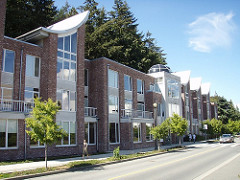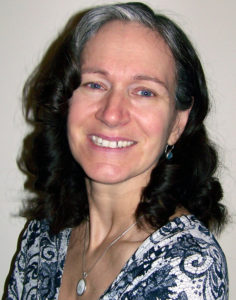 This week’s interview is with Joanne Perdue, Director of Sustainability for the University of Calgary. Before joining the university, Joanne worked for many years as an architect on high performance green buildings. One of her most notable projects was the C.K. Choi Building at the University of British Columbia, a groundbreaking green building for its time. Joanne believes that when institutions take the lead in modeling sustainability they will in turn produce students who will demonstrate principles of sustainability in their personnel and professional lives. Continue reading to learn more about the work Joanne and the University of Calgary are doing.
This week’s interview is with Joanne Perdue, Director of Sustainability for the University of Calgary. Before joining the university, Joanne worked for many years as an architect on high performance green buildings. One of her most notable projects was the C.K. Choi Building at the University of British Columbia, a groundbreaking green building for its time. Joanne believes that when institutions take the lead in modeling sustainability they will in turn produce students who will demonstrate principles of sustainability in their personnel and professional lives. Continue reading to learn more about the work Joanne and the University of Calgary are doing.
What campus sustainability initiatives are you working on at the moment?
As the Director, my mandate is to define strategic direction and organizational structures which will transition the U of C into a campus sustainability leader. The scope is pan-university enabling a cross-departmental and systems level approach. On a day-to-day basis my staff and I mentor and coordinate 13 teams addressing various portfolios of campus sustainability. Our goal is to build internal capacity and cross-departmental processes so that sustainability is integral to how the U of C engages in teaching, research, community service and institutional operations.
 How did you get started in campus sustainability?
How did you get started in campus sustainability?
As an architect I have spent most of my career on advocacy and the delivery of high performance green buildings. In more recent years I was focused on advancing the performance of community and larger infrastructure systems. When the opportunity arose to work with the full portfolio of a campus and facilitate a much larger scale of change it was a natural next step.
What campus sustainability success(es) are you most proud of?
Two things come to mind. The first is watching the evolution of our teams. Many began with reservation and skepticism about our institution’s capacity to become a leader; we are now starting to see committed champions who are truly proud of their progress. The second is President Weingarten’s commitment to the University + College President’s Climate Change Statement of Action for Canada and the tangible progress that U of C is making in this area. When the retrofit of our central heating and cooling plant comes on line in 2011, U of C will achieve an approximate 39% reduction in CO2e from our 1990 levels for building operations. I’m very excited about the comprehensive planning work we are undertaking this year in support of the Presidents’ Climate Change Statement of Action.
What advice would you give to others in your position who are just getting started?
You need to be positioned to contribute to strategic planning that enables effective scales of change; but don’t forget to focus on the smaller initiatives that demonstrate tangible progress. Measurement is essential to define an accurate current context and in turn identify where to focus your efforts; ongoing measurement then confirms if your initiatives are making real progress. Last, institutional transformation happens outside of any office of sustainability; invest in capacity building at both governance levels and the actual points of delivery.
In what area(s) do you see the biggest room for growth in the campus sustainability field?
Undoubtedly this has to be the realm of teaching and research. There is still an overarching perspective that campus sustainability is about a prescriptive checklist comprised of recycling initiatives, green cleaning, etc. These prescriptive items are in many respects the low hanging fruit of campus sustainability. Like many institutions the U of C conceptually recognizes the importance of trans-disciplinary collaboration and critical inquiry from a systems perspective. Yet the change has yet to take root as a new paradigm; the challenges are overcoming the legacy of basing tenure on independent specialization and the absence of institutional structures that foster and reward interdisciplinary collaboration.
How are you incorporating the social dimensions of sustainability into your work?
The most tangible and far-reaching step is our soon-to-be released Supply Chain Management Sustainability Policy which will include triple bottom line and vendor code of conduct evaluation in institutional procurement. We do not as yet have a formalized code of ethics for institutional investments. A number of our Faculties are working locally and abroad in support of health and social equity at both individual and community scales. On campus we promote Fair Trade through conferences and the sale of Fair Trade coffee and other goods. Certainly this is an area where student knowledge is much more advanced than that of the institution.
How are your sustainability efforts funded?
For the big steps such as the co-generation initiative, we build a project-specific business case that includes capital costs, operating savings and proposed funding mechanisms. Funding might be a loan with a defined payback period from operational savings or it might be tied to the annual Infrastructure Maintenance Program. Each business unit is asked to address sustainability within their annual business planning and budgeting cycle, so that they take ownership of their sustainability contributions as part of how they do business. Additionally, the Office of Sustainability has an annual operating fund to cover our staff costs, outreach programs that are cross departmental, student support and smaller scale initiatives that kick-start change.
In what ways are students involved in your work?
The Office of Sustainability offers one-year full-time and part-time paid internship positions as well as summer research grants in sustainability. Our 13 teams working on sustainability are open to students. To date students have been more interested in short-term, project-specific commitments. We also have a partnership with the Student Union for a Green Café which provides a regular meeting ground for student clubs and individual students to share information and advance student leadership and collaboration on sustainability.
Are you involved in efforts to advance sustainability in curriculum at the University of Calgary?
Yes, although that one is much more complicated to advance. We have engaged in discussions with Deans and academic Executive Directors as well as individual faculty members interested in advancing sustainability in both curriculum and research. The perspectives on how to advance this are complex and varied. We are currently working with a faculty member in Communications + Culture who is exploring the Talloires Declaration and sustainability literacy through two of her courses. The student findings from these courses are very different again and are furthering our understanding. Over the next year we hope to use targeted symposia to advance an institutional understanding of sustainability in curriculum and identify tangible next steps. To be successful at a meaningful scale I believe that this change must be led by Faculties themselves; I don’t think that this can be externally imposed.
How are you approaching the issues around carbon offsets and or renewable energy credits (RECs)?
For me offsets and RECs are the last step in achieving net zero emissions. To meaningfully address climate change we must first significantly and rapidly lower our CO2 footprint. I worry that purchasing of offsets becomes an offput to essential action.
Is there a particular insight (learning experience or “ah-ha” moment) you have had working on campus sustainability?
I regularly experience “ah-ha” moments. Sustainability and the different scales of context that we must respond to are evolving so rapidly. That is part of what I love about this position; I am always learning and growing. I find myself regularly humbled by the depth of the challenge that the world faces and at times just within my own institution. I am also regularly inspired by the breadth of dedication and action locally and globally in support of a brighter future.